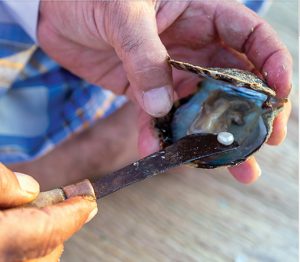Abu Dhabi / WAM
The Environment Agency – Abu Dhabi (EAD) has partnered with the Food and Agriculture Organisation (FAO) of the United Nations in a joint effort to revive the heritage and traditions of the emirate’s pearl industry. The “Abu Dhabi Pearls†project involves sustainably farming high-quality pearls in the warm waters of the Arabian Gulf.
The project comes as part of a broader collaboration between FAO and the UAE’s Ministry of Climate Change and Environment (MOCCAE) which focuses on introducing sustainable aquaculture and building a sector that creates jobs, protects the environment and supports livelihoods in the long term.
In 2019, EAD launched the sustainable aquaculture policy for Abu Dhabi, which aims to promote growth in the emirate’s aquaculture sector and raise its competitiveness to ease pressures on overexploited local fisheries.
The FAO is a main partner on the
project and supports and develops
aquaculture-related research.
The Abu Dhabi Pearls Project was established in 2007 and set an ambitious goal of cultivating approximately 80,000 oysters, producing approximately 20,000 high-quality and sustainable pearls annually in the emirate’s waters.
Through this project, EAD seeks to provide an educational and awareness platform on the sustainable cultivation of oysters by organising visits for school and university students, government agencies and institutions and
foreign delegations.
Within the framework of the existing cooperation between FAO and EAD, the two parties seek to shed light on pearl farming techniques while promoting them as a key model for sustainable aquaculture that provides many environmental, social and economic benefits. The partnership includes knowledge sharing, the provision of technical support, and organisation of technical aquaculture workshops.
The agency and FAO are also working closely to highlight EAD’s efforts in the field of pearl farming as a global example of successful, sustainable aquaculture.
The Environment Agency is also a key partner of FAO thanks to its pioneering work within the fisheries and aquaculture fields, which are key sectors for the UN organisation. By bringing together global and local expertise, the partnership between EAD and FAO will help to support and develop the aquaculture sector in the emirate.
With technical support from FAO, the UAE is investing in modern technologies to develop a sustainable and economically viable aquacultural sector that will preserve the country’s fish stocks and enhance its food security.
This also combines the traditional cultural heritage of pearl diving with modern techniques.
Ahmed Al Hashemi, EAD’s Executive Director of Terrestrial and Marine Biodiversity, said, “Pearl diving was once a risky profession that provided seasonal employment and an opportunity for wealth and prosperity. It was never merely a trade or a means of subsistence, but an entirely integrated social system that has nurtured a rich heritage of traditions. At EAD we continuously seek to protect our national heritage while protecting the environment, and the development of sustainable practices within aquaculture is driving our efforts, supported by our fruitful cooperation with FAO.”
Lionel Dabbadie, FAO Senior Aquaculture and Fishery Officer at the FAO Office in Abu Dhabi, said, “The pearl oyster project designed and implemented by EAD does not only provide a source of income for young Emirati entrepreneurs, but it also contributes to conserve biodiversity and protect the ecosystem, in line with the Blue Transformation objectives that FAO promotes. By partnering with EAD, FAO looks forward to developing sustainable aquaculture and contributing to achieving the UAE goal of becoming a world-leading hub in innovation-driven food security by 2051.”
Since its establishment, the project has helped to revive the sector’s heritage and preserve local oysters and pearls through participation in local and international events. Joint projects with educational institutions were also launched, along with a technical component to create jewellery designs using cultured pearls.
 The Gulf Time Newspaper One of the finest business newspapers in the UAE brought to you by our professional writers and editors.
The Gulf Time Newspaper One of the finest business newspapers in the UAE brought to you by our professional writers and editors.
